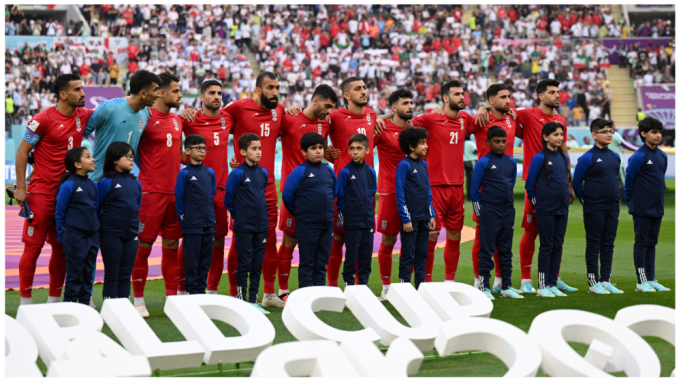Sports and Politics: The Geopolitical Reality
The 2022 FIFA World Cup is more than a field of spirited athleticism. While FIFA told all 32 competing nations to “focus on football,” geopolitical tensions surround the narrative. The championship taps into the socio-political atmosphere, with an air of athlete-led activism fueled by social, religious, and political issues.
Qatar- A Controversial Location?
The 2022 FIFA World Cup in Qatar is mired in controversies. In 2010, FIFA awarded hosting rights for the 2018 and 2022 tournaments to Russia and Qatar; a decision that led to an outpour of criticism. It is widely believed that political pressure, FIFA corruption, and bribes contributed to the decision.
Given the country’s many human rights violations and allegations of corruption, Qatar was a controversial choice to host the World Cup. Lack of freedom of expression, association, press, male guardianship laws, gender inequality, and anti-LGBTQ+ policies that criminalize same-sex relationships have become a focal point of athlete activism. Migrant workers’ deaths due to World-Cup-related projects highlighted the dire working conditions. More recently, torture and coercive interrogations have brought Qatar’s unfair judicial system to the limelight, particularly in the case of Abdullah Ibhais, an ex-World Cup employee and whistleblower.
It is crucial, however, not to ignore the importance of this World Cup as the first to be held in the Middle East and Arab World. Georgetown University Professor Abdullah Al-Arian contextualizes the history of football in the Middle East, “The story of Arab football — like so much in the region — is tied up in the history of colonialism and the struggle against it.” Soccer–or football– is deeply embedded in the Arab world. It represents a distinct identity among football nations and simultaneously serves as a uniting force transcending cultural boundaries.
Players Lead Activism
Athlete-led activism and political expression have been at the heart of this World Cup.
Initially, the captains of seven European nations planned to wear OneLove LBGTQ+ armbands to promote inclusion; however, they restrained after FIFA threatened that athletes wearing OneLove armbands would be given a yellow card. FIFA has faced significant backlash because of this decision. In their game versus Japan, German players protested FIFA’s decision by covering their mouths in solidarity with the LGBTQ+ community in Qatar. The German team’s Twitter account wrote, “It wasn’t about making a political statement — human rights are non-negotiable.”
In their match against England, the Iranian team made a show of resistance by staying silent as the Iranian national anthem played. They declined to sing their national anthem in apparent solidarity with the demonstrations against clerical rule back in their homeland.
Politically Charged Matches
The Iran v. US match on November 29, 2022, was considered one of the most politically charged matches since Iran’s 1998 2-1 victory over the US. The decades of hostilities between the two nations may be traced to the 1979 Islamic Revolution and the subsequent American Hostage Crisis. This World Cup has seen strained US-Iran relations unfolding on and off the field. In a social media post, the US Soccer Federation erased the emblem of the Islamic Republic from the Iranian flag in an apparent gesture of support for the anti-government protests in Iran. The USSF said in a statement that they decided to omit the Islamic symbol to show “support for the women in Iran fighting for basic human rights.” The Iranian government responded in outrage and accused America of dishonoring their values by “removing the symbol of Allah.”
While neither country qualified for the World Cup, the metaphorical match between Israel and Palestine drew emphatic followers in a show of “Arab solidarity.” Arab fans chanted “Free Palestine!” in the World Cup TV studio. In the Tunisia v. France match, a Tunisian supporter came running onto the field carrying the Palestinian flag. After their 2-1 victory over Canada, Moroccan players, Jawal el Yamiq and Selim Amallah did their victory lap with the Palestinian flag.
The Intersectionality of Politics and Sports
Political controversies in international sporting events are not new. The politicization of sports has been prevalent since the first modern Olympics in 1896. The 1936 Berlin Olympics hosted by Nazi-ruled Germany were a vehicle for the Party’s racial and national supremacy theories. The Israel-Palestinian conflict fueled the Munich massacre at the 1972 Olympic Games in Munich. In 1976, twenty-nine African nations boycotted the Montreal Olympics to condemn South African apartheid. The 1980s saw Cold War politics manifest on the playing field. The US boycotted the 1980 Olympics in Moscow in response to the Soviet invasion of Afghanistan. The Soviets, in turn, retaliated by boycotting the 1984 Olympics in Los Angeles.
Russia hosted the last World Cup in 2018 under intense scrutiny on labor exploitation of North Korean workers and “anti-gay purges” in the Russian Republic of Chechnya. Similarly, the 2022 Winter Olympics in China put a spotlight on China’s forced labor practices and the mass detention of the Uyghur Muslim minority in Xinjiang.
While the geopolitical realities cannot be ignored, the symbolism of the first Arab World Cup is historically significant. As Dr. Al-Arain eloquently says, “Football is a cultural force like no other. Its intricate history has transcended boundaries and captured the hearts of millions in the Middle East and beyond.”
Samya Madhukar (she/her) is a junior at Shaker High School and is serving her first year as Co-Editor-In-Chief and Writing & Editing Team Leader for...


